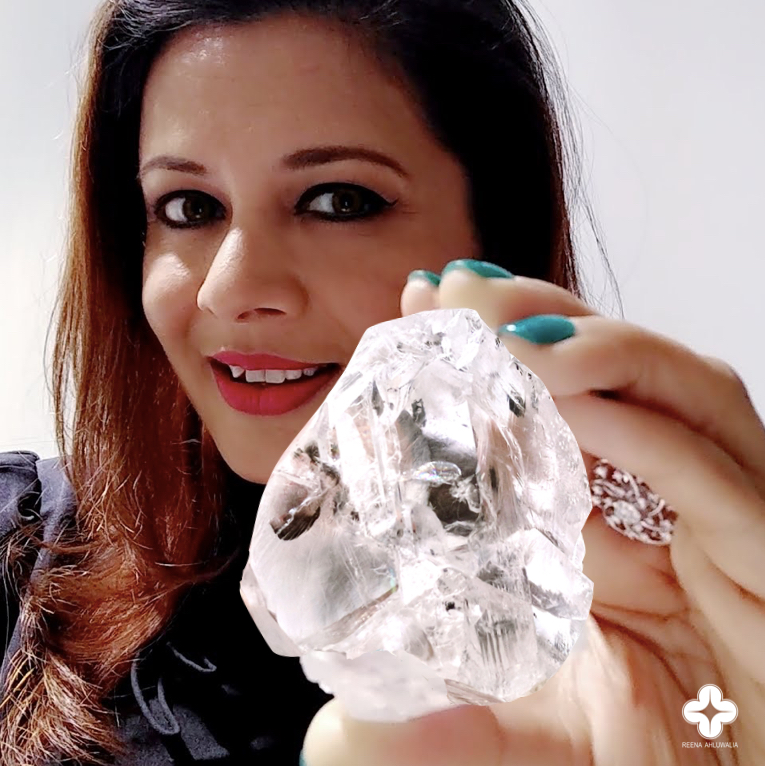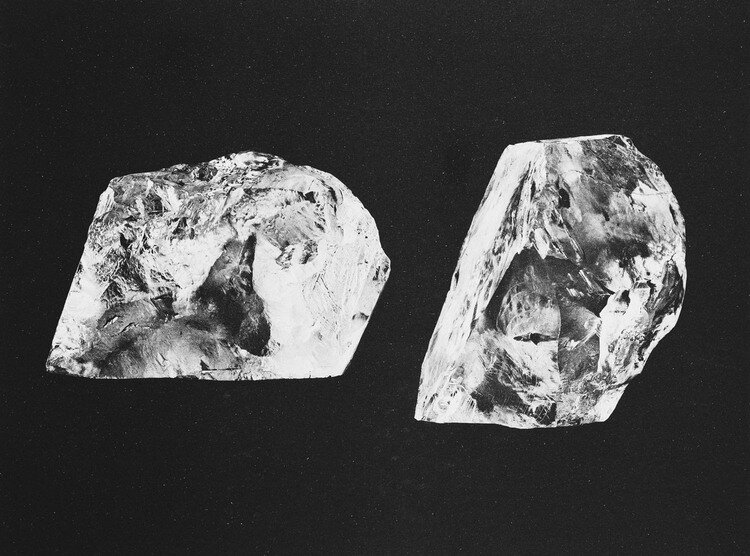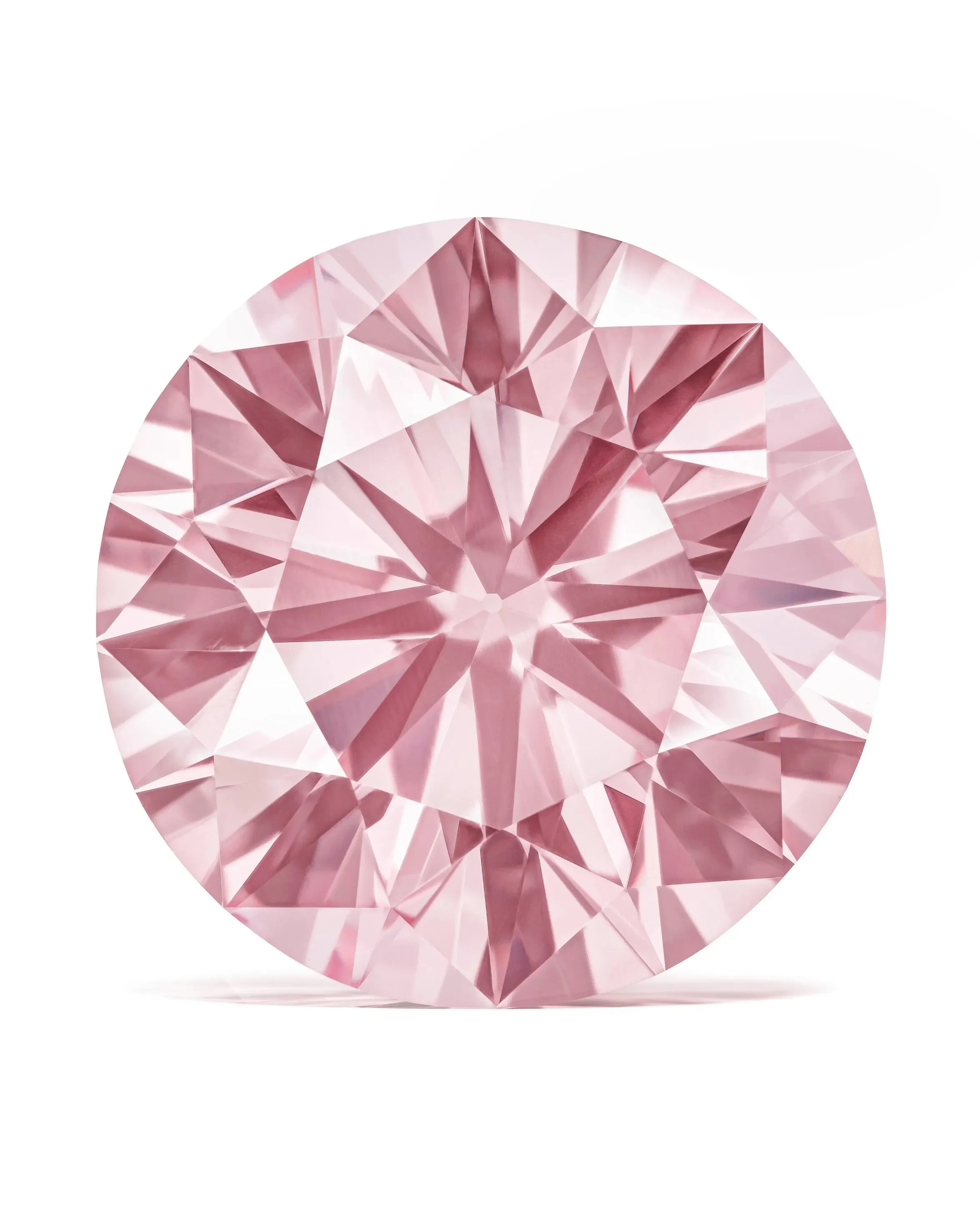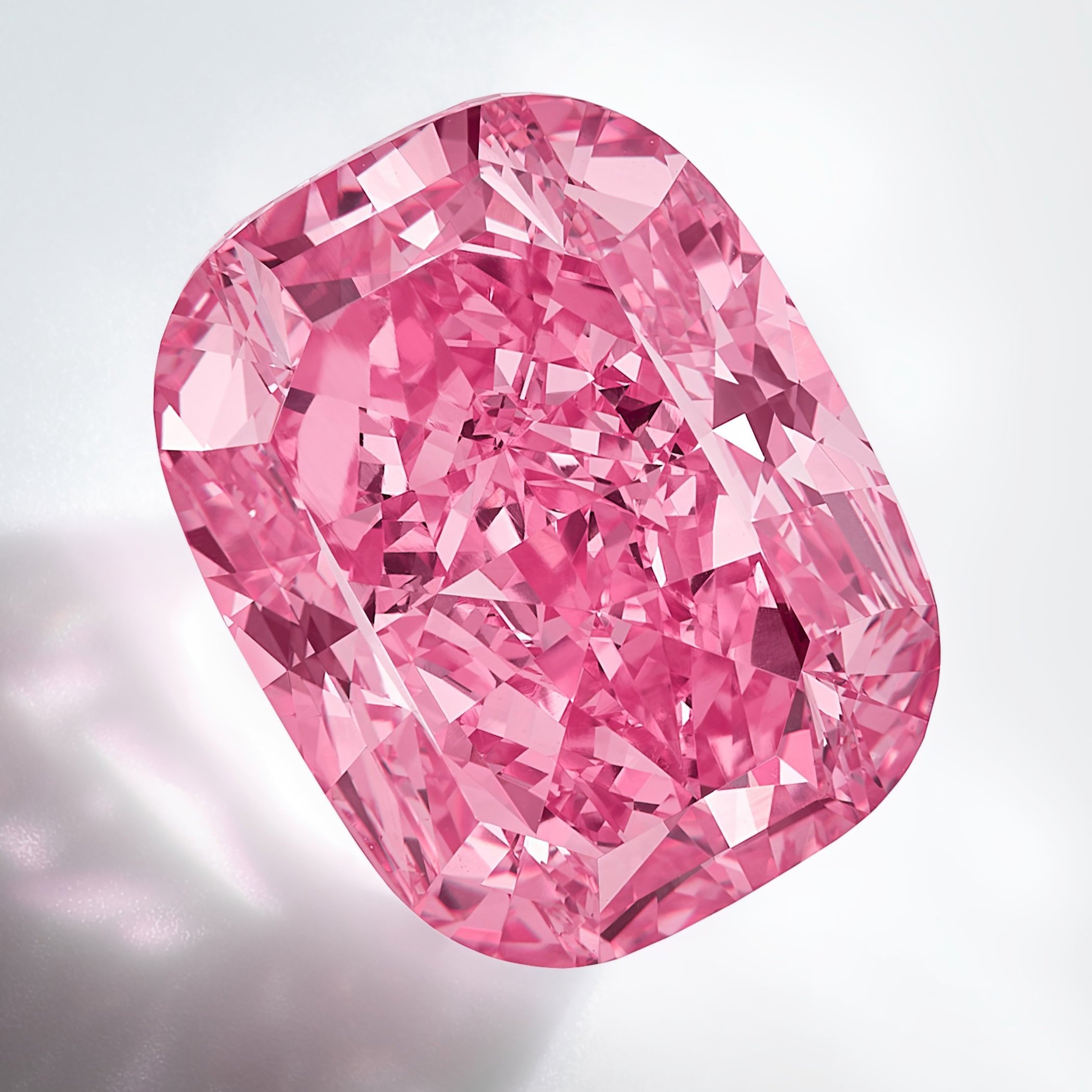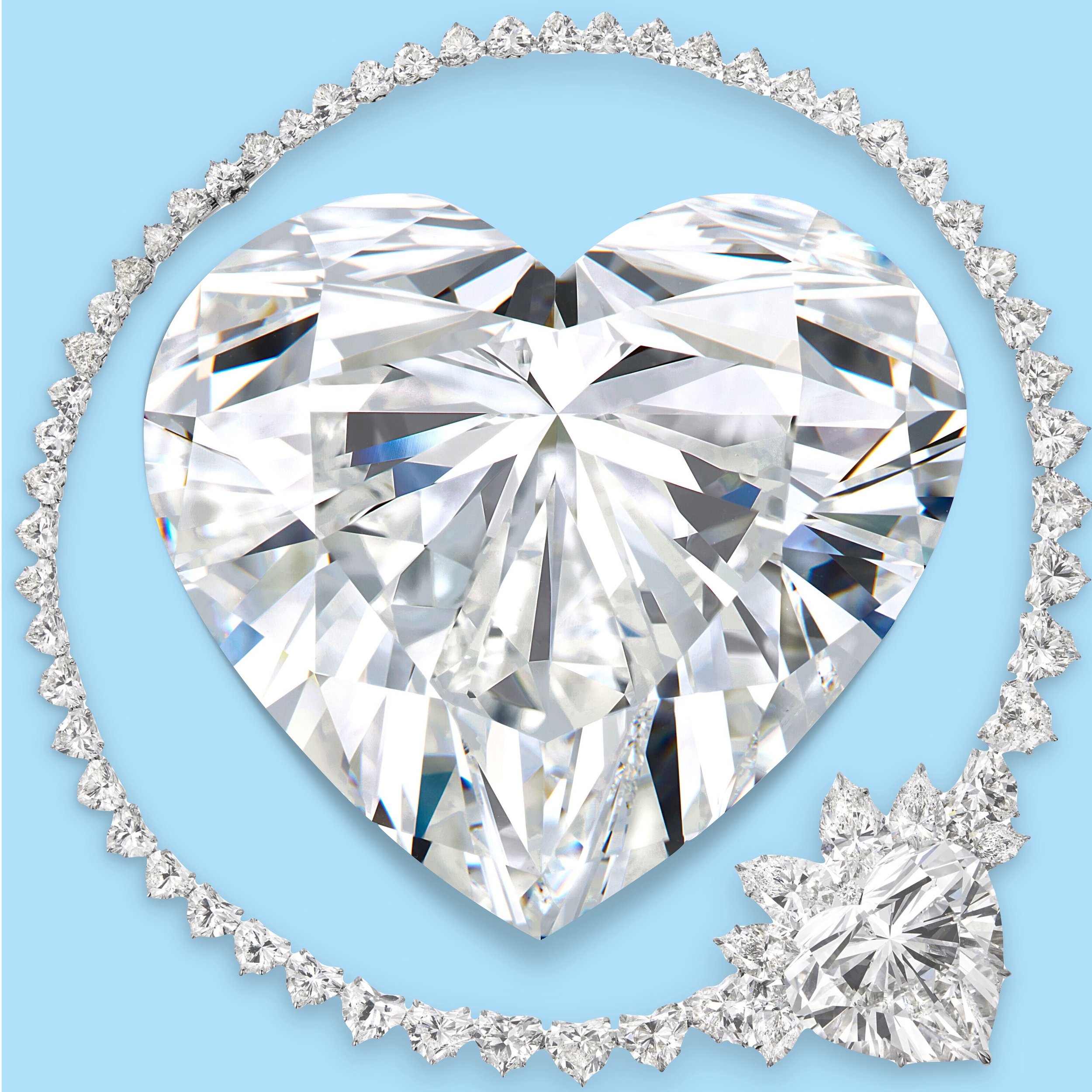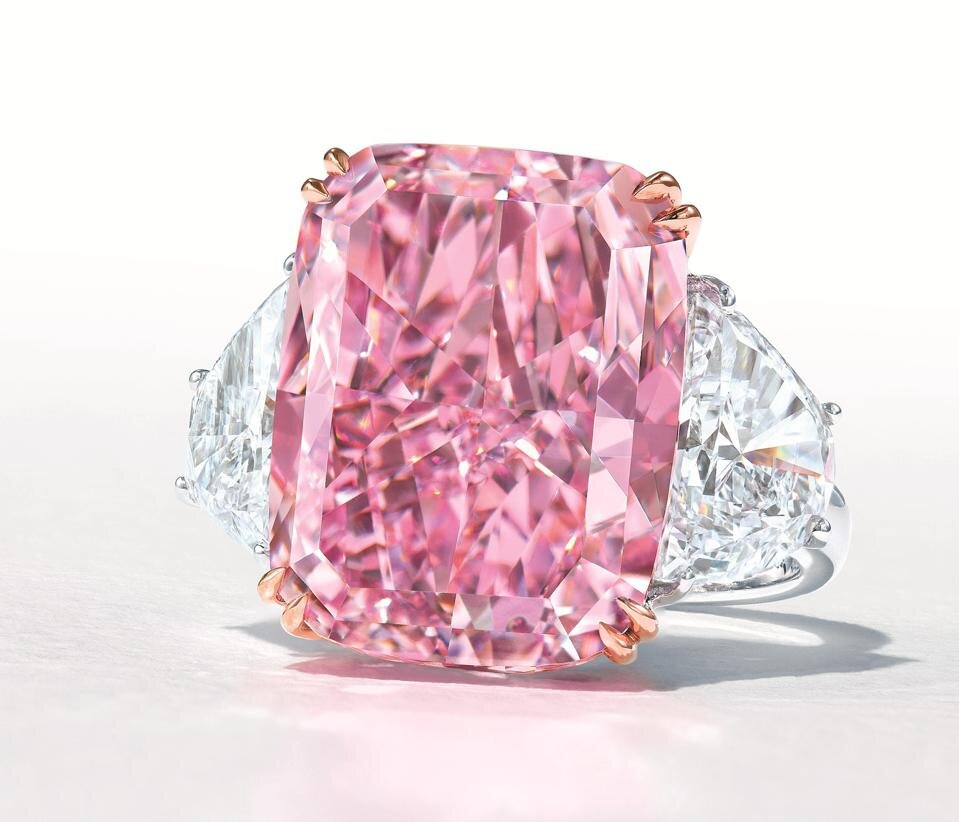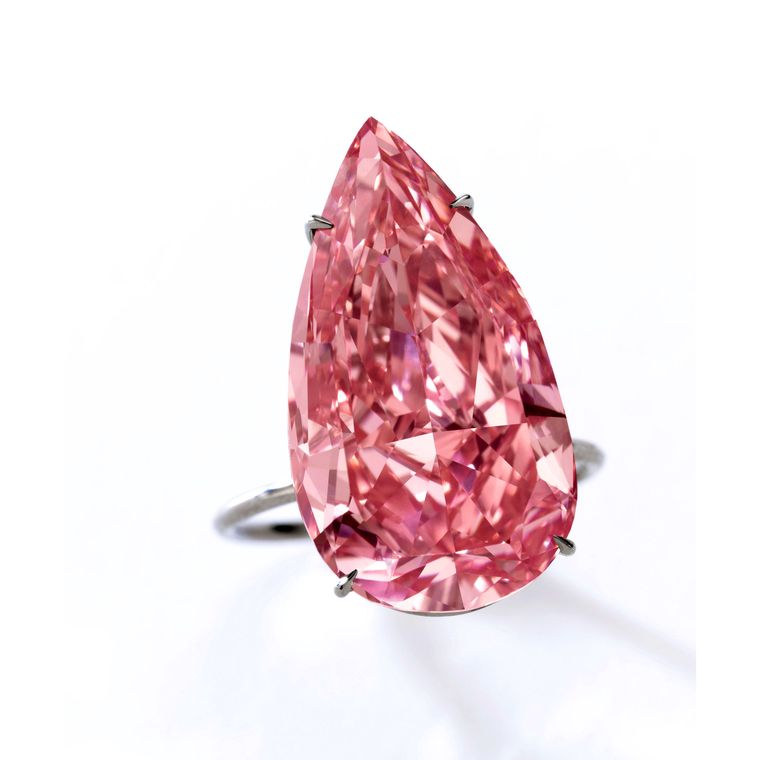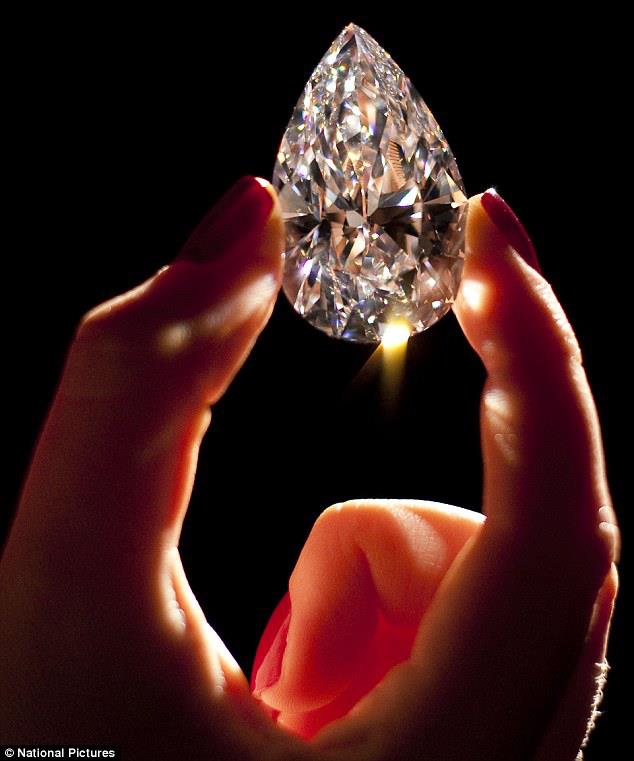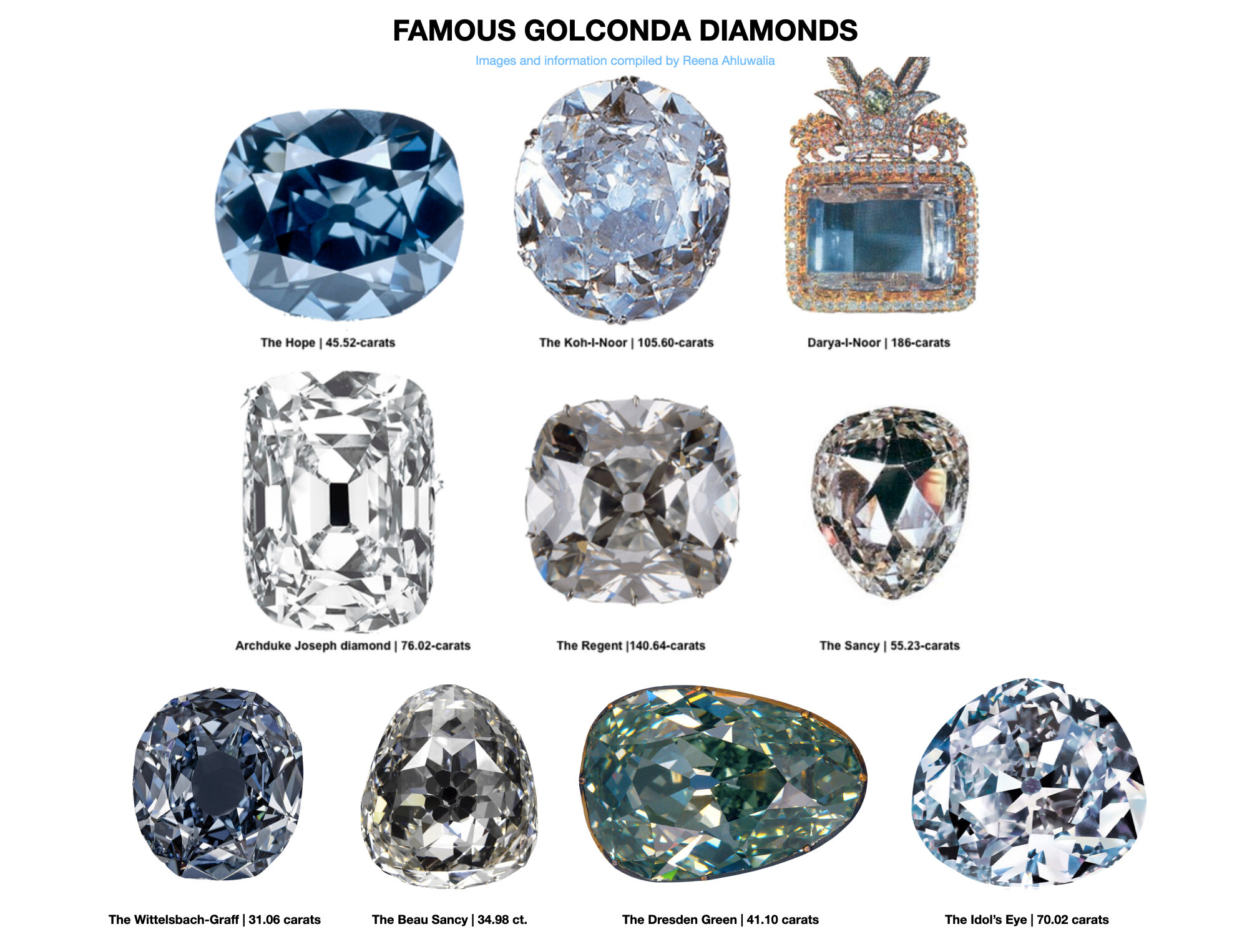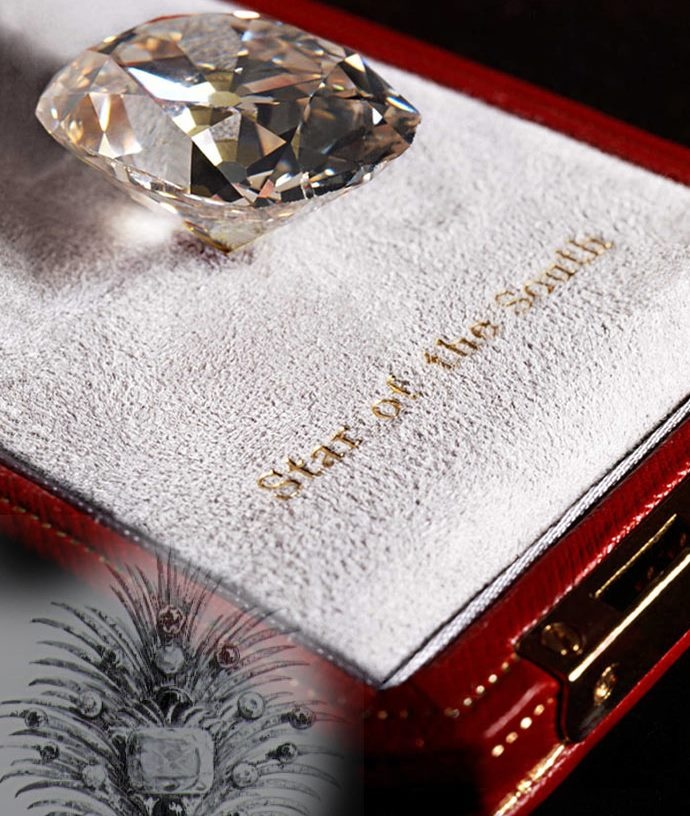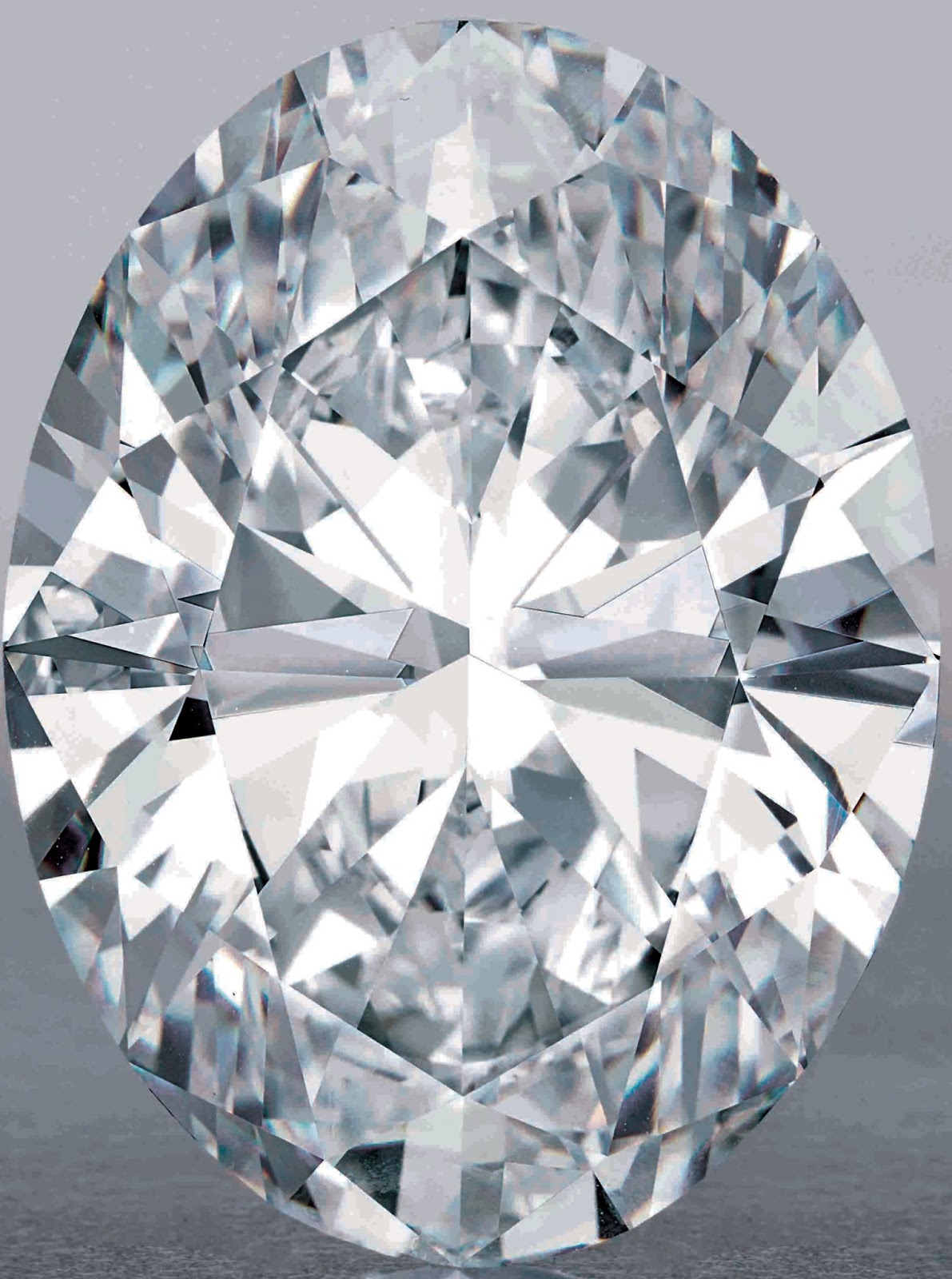The Bejeweled Maharaja and Maharani Paintings of Royal Mysore by Reena Ahluwalia. My paintings act as a bridge between the past and the present, reminding us of the significance these gems hold in Indian culture. I have painted the Maharaja and Maharani as beings with diamond-clad bodies, wearing historically accurate jewels. A reminder that we too are the modern-day Maharajas (king) and Maharanis (queen) of our own lives, and can leave a lasting legacy, as enduring and luminous as the diamonds and gemstones that grace the Maharaja and Maharani. The Royal Mysore paintings are in the permanent collection of the CKC Crystal Museum, in Bengaluru, India.
Read moreType IIa Diamonds
Type IIa diamonds are the most valued and the purest type of diamonds. They contain either very little or no nitrogen atoms in the crystal structure. White stones are exceptionally colorless and fancy colored diamonds are often found with a brown, purple, blue, or pink tone. They represent only 1% - 2% of all mined diamonds in the world.
What makes the Type IIa diamonds even more special is that they are “super-deep” diamonds. Most Type IIa diamonds originate from extreme depths in Earth’s mantle, a depth between 360 and 750 km. To put it in context, most diamonds are formed between 150 to 230 kilometers below the Earth's crust.
In the world of mined diamonds, Type IIa are so rare that they command a 5% to 15% premium, when they can be found.
One of the most well-known examples is the “Elizabeth Taylor Diamond” (formerly known as the “Krupp Diamond”), a 33.19-carat Type IIA diamond.
Purchased for $300,000 in 1968 by Richard Burton, the ring became one Elizabeth Taylor’s most cherished white diamonds; one she wore nearly every day. Of the ring, she once said, “[It] gives me the strangest feeling for beauty. With its sparks of red and white and blue and purple, and on and on, really, it sort of hums with its own beatific life.” The Asscher-cut diamond ring recently sold at auction for a whopping $8.8 million.
Other iconic historic Type IIa diamonds include the Cullinan, the Lesedi La Rona, the Koh-I-Noor, the Darya-I-Noor, the Archduke Joseph, the Regent, the Agra, The Star of the South, The Winston legacy and the Beau Sancy. Type IIa diamonds also have a famous historic connection with Golconda diamonds mined from the historic Kingdom of Golconda in India.
Reena Ahluwalia holds the Type II A, D-color, 910-carat ‘The Lesotho Legend’, the fifth-largest gem diamond in history. In 2018, the diamond was sold for $40 million. The diamond is from the Letseng mine in Lesotho, a country encircled by South Africa. According to Gem Diamonds, it was the largest diamond to have been recovered from the mine (untill 2018).
Cullinan Diamond is a Type IIa, super-deep diamond. Photograph showing two models (replicas) of the original stone. The Cullinan Diamond was discovered in South Africa in 1905 and presented to King Edward VII in 1907. Image: Royal Collection © Her Majesty Queen Elizabeth II
Famous Type IIa Diamonds.
Shown here: (1) The De Beers Millennium Star | 203.04 carat, (2) The Lesedi la Rona | 1109 carat, (3) The Koh-I-Noor | 105.60 carat, (4) The Pink Legacy | 18.96 carat, (5) The Idol's Eye | 70.21 carat, (6) The Cullinan I | 530.20 carat, (7) The Graff Venus | 118.78 carat, (8)The Agra | 28.15 carat. Images and information complied by Reena Ahluwalia.
The Eden Rose, a 10.20-carat Fancy Intense Pink Diamond is a Type IIA diamond. Image: Christie’s, 2024. The stone is clear of any secondary hues like gray, blue, or purple that are common in natural pink diamonds.
The Eternal Pink sold for $34.8 Million. The cushion mixed-cut Fancy Vivid Purplish Pink diamond weighing 10.57 carats. Of all the diamonds submitted to the GIA, less than 3% are classified as colored diamonds, and less than 5% of those are considered predominantly pink. The Eternal Pink is arguably the most important pink diamond ever to appear at auction. The diamond was discovered in 2020 at the Damtshaa mine in Botswana. The rough weighed 23.78 carats and was carefully cut in Diacore’s New York City facility over a period of six months. Image: Sotheby’s, 2023.
Other famous, historic pink diamonds are the Agra, the Regent, the Williamson Pink and the Darya-i-Noor.
This extraordinary 76.46-carat heart-shaped diamond is a Type IIA diamond. Came up at the Christie’s New York Magnificent Jewels sale in 2022. Image: Christies.
The Sakura Diamond is a 15.81 carat, largest Fancy Vivid Purple-Pink Internally Flawless Type IIa diamond to ever appear at auction. Sold at Chrisrie’s for $29.3 million in Hong Kong in May 2021 to become the most expensive purple-pink diamond ever to sell at auction. Image: Christie’s.
The 102.39 carat, Maiko Star Diamond is a Canadian, Type IIa, D Colour, Flawless Oval Diamond. Held here by Sotheby’s employee during a media preview at Sotheby's on Sept. 9, 2020 in New York City. PHOTO BY ANGELA WEISS /AFP via Getty Images.
Read my interview about this colossal TypeIIa diamond here: https://www.cbc.ca/news/business/diamond-auction-1.5723379
The diamond was sold to a Japanese private collector who names the gem ‘Maiko Star’ after his second daughter. The same collector bought the 88.22-carat ‘Manami Star’ at Sotheby’s in April 2019 for his first daughter.
The 102.39 carat, Maiko Star Diamond is a Canadian, Type IIa, D Colour, Flawless Oval Diamond. Image: Sotheby’s.
The Spirit of Rose diamond, is a 14.83 ct Fancy Vivid Purple-Pink, IF, Type IIa diamond. Only 1% of all pink diamonds are larger than 10-carats and only 4% of all pink are graded ‘Fancy Vivid’. Named ‘The Spirit of the Rose’ after Vaslav Nijinsky’s legendary ballet, Le Spectre de la rose, the diamond was mined, cut and polished in Russia. Its unparalleled qualities make it the largest Purple-Pink diamond to ever appear at auction. Credit: Sotheby’s, 2020
The rough diamond was unearthed by ALROSA from the Ebelyakh deposit in the Republic of Sakha (Yakutia) in the northeast of Russia in July 2017. The stone was cut from the largest pink crystal ever mined in Russia which is currently the world’s most important diamond producer by volume. The 27.85-carat clear pink rough diamond was itself called the “Nijinsky”, a nod to the legendary dancer and his acclaimed performance as the “Rose” in the original Ballets Russes performance. The Spirit of Rose diamond, is a 14.83 ct Fancy Vivid Purple-Pink, IF, Type IIa diamond. Credit: Sotheby’s, 2020
The 100-carat D flawless shield-shaped diamond was bought by Moussaieff for over $6 million in July 2020. Image: Moussaieff
The Pink Legacy, a Fancy Vivid Pink, Type IIA, cut-cornered rectangular-cut diamond of 18.96 carats. This incomparable pink diamond has descended from the Oppenheimer Family and was sold for $50.4 million. Image: Christie’s / 2018
Stephen Silver, gemologist and jeweler, who is known for his keen eye for gemstones sold the Pink Promise, a Type IIa, 14.93 carat Fancy Vivid Pink Diamond for $32 million at the Christies’ Hong Kong Auction, 2017.
Pear-shaped, Type IIa “Artemis Pink” and Type IIb “Apollo Blue”, Sotheby's + Reena Ahluwalia 'Portal of Dreams' diamond painting.
The Artemis Pink is a Type IIa, Fancy Intense Pink Diamond weighing 16.00 carats. Image: Sotheby's
Unique Pink, a 15.38 ct. fancy vivid pink diamond, the largest fancy vivid pink pear-shaped diamond ever offered at auction. Image: Sotheby's 2016
The largest D flawless, Type IIa, round brilliant diamond in the world. 102.34 carat. At 102.34 carats, this masterpiece of nature is the rarest white diamond ever to come to the market and the largest, round D colour flawless diamond known to man. The only stone of its kind ever graded by the GIA, the diamond has achieved the highest rankings under each of the criteria by which the quality of a stone is judged. The diamond is D colour; of exceptional clarity (it is completely flawless, both internally and externally); and has excellent cut, polish and symmetry. As with the famous Cullinan I and Koh-i-noor diamonds, which are part of the British Crown Jewels, the stone is part of the rare subgroup comprising less than 2% of all gem diamonds, known as Type IIa. Diamonds in this group are the most chemically pure type of diamond and often have exceptional optical transparency. Image: (AP Photo/Alastair Grant) / Sotheby's / 2018
The largest D flawless, Type IIa, round brilliant diamond in the world. 102.34 carat. Image: (AP Photo/Alastair Grant) / Sotheby's / 2018
Dubbed as the 'RAREST WHITE DIAMOND' - Sotheby's 102.34 ct, D Flawless, Type IIa. Was cut from a 425-carat rough mined by the De Beers Group in Botswana. 2018. Image: Nils Jorgensen/REX
Dubbed as the 'RAREST WHITE DIAMOND' - Sotheby's 102.34 ct, D Flawless, Type IIa. Was cut from a 425-carat rough mined by the De Beers Group in Botswana. 2018. Image: WENN
THE QUEEN OF KALAHARI - an ultra-rare 342-carat, Type II A, D-Flawless diamond found by Lucara Diamond Corp in 2010 at Karowe, Botswana.
THE QUEEN OF KALAHARI - an ultra-rare 342-carat, Type II A, D-Flawless diamond found by Lucara Diamond Corp in 2010 at Karowe, Botswana. This magnificent stone was transformed into THE GARDEN OF KALAHARI, a collection of six jewellery creations by Caroline Scheufele, Chopard. http://www.chopard.com/diary/the-queen-of-kalahari/
THE GARDEN OF KALAHARI, a collection of six Type II A diamond jewellery creations by Caroline Scheufele, Chopard. http://www.chopard.com/diary/the-queen-of-kalahari/
THE GARDEN OF KALAHARI, a collection of six Type II A diamond jewellery creations by Caroline Scheufele, Chopard. http://www.chopard.com/diary/the-queen-of-kalahari/
Lucara Diamond sold giant Type IIa, 813-ct. Constellation diamond for $63M US in May 2016. Just to put all this in perspective, it is the the highest price ever achieved for the sale of a rough diamond. Image: Lucara Diamond Corporation
At 1109-carat, the "Lesedi La Rona" is the largest gem-quality rough diamond to be discovered in over a century and the largest Type IIa rough diamond in existence today. Image: Lucara Diamond Corporation
At 118.78 carats, the “The Graff Venus” is the world’s largest D-color, Type IIA, flawless heart-shaped diamond. The Graff Venus was cut from a 357-carat rough diamond discovered in 2015 at the Letšeng Mine in Lesotho. Image: Graff Diamonds
At 118.78 carats, the “The Graff Venus” is the world’s largest D-color, Type IIA, flawless heart-shaped diamond. The Graff Venus was cut from a 357-carat rough diamond discovered in 2015 at the Letšeng Mine in Lesotho. Image: Graff Diamonds
100.20-Carat, Type IIa, Internally Flawless 'Perfect Diamond' could fetch $25 Million in auction in New York in 2015. Photo courtesy: Sotheby's
100.20-Carat, Type IIa, Internally Flawless 'Perfect Diamond' could fetch $25 Million in auction in New York in 2015. Photo courtesy: AP
100.20-Carat, Type IIa, Internally Flawless 'Perfect Diamond' could fetch $25 Million in auction in New York in 2015. Photo courtesy: Reuters
The 100.20-carat "Perfect" diamond during the cutting and polishing process. The original rough weighed more than 200 carats and was mined by De Beers in southern Africa. It took more than a year to study, cut and polish the rough into the 100-carat diamond. Photo courtesy: Sotheby's
The 100.20-carat "Perfect" diamond during the cutting and polishing process. The original rough weighed more than 200 carats and was mined by De Beers in southern Africa. It took more than a year to study, cut and polish the rough into the 100-carat diamond. Photo courtesy: Sotheby's
The 'Winston Legacy' is the largest white diamond ever to come to auction. The 101.73ct, Type IIa, pear-shaped, D colour, flawless diamond was sold to Harry Winston at Christie's auction of jewels in Geneva on 15 May 2013. Its the "largest of its type" ever offered for public sale. Christies Images Ltd 2013.
World’s largest "flawless" D-color, colorless diamond at 101.73 carat. The stone was recently cut from a rough diamond, weighing 236 carats, that had been found at the Jwaneng mine in Botswana. It took 21 months to polish. The diamond is a Type IIa, less than 1% of the world's diamonds are Type IIa.
D-colour, internally flawless, Type IIa diamond of 56.15 cts. In 2011, sold at auction, and becoming a world auction record for any heart-shaped diamond. Image: Christie's
The “Elizabeth Taylor Diamond” (formerly known as the “Krupp Diamond”), a 33.19-carat Type IIA diamond. I had the honor of trying out this legendary beauty at Christie's New York. Memorable moment!
The “Elizabeth Taylor Diamond” (formerly known as the “Krupp Diamond”), a 33.19-carat Type IIA diamond. Purchased for $300,000 in 1968 by Richard Burton, the ring became one Elizabeth Taylor’s most cherished white diamonds; one she wore nearly every day. Of the ring, she once said, “[It] gives me the strangest feeling for beauty. With its sparks of red and white and blue and purple, and on and on, really, it sort of hums with its own beatific life.” The Asscher-cut diamond ring recently sold at auction for a whopping $8.8 million.
The Archduke Joseph Diamond. 76.02cts., D color, Internally Flawless, Type IIA. Image: APF
Type IIa and connection with Golconda Diamonds.
A Golconda diamond is a diamond from a specific geographic area within the historic Kingdom of Golconda in India. Diamonds with proven Golconda provenance are of a specific type of rare, pure carbon diamond known as Type IIa. Less than 1-2% of the world's diamonds are Type IIa.
The kingdom of Golconda is situated in India's Deccan plateau. Golconda was a region located between the lower reaches of the Godavari, Wainganga, Wardha and Krishna-Venva rivers, in the present-day states of Maharashtra and Andhra Pradesh, central India.
Koh-i-noor is one of the most celebrated Indian diamonds and perhaps the best-known. A modified oval brilliant cut, the 105.60 ct diamond is set in Queen Elizabeth the Queen Mother’s Crown. This is the name of the platinum crown that was designed for Queen Elizabeth, consort (or wife) of George VI, to wear at the Coronation of her husband in 1937. The Koh-i-noor is now on display in the Tower of London. Photo: Kenneth Scarratt. Courtesy: The Gemmologists, the Crown Jewels. Via GIA
The Idol’s Eye is Type IIb diamond, a 70.20 ct Very Light blue diamond that has been described as being between and round and a pear shaped brilliant cut It is believed to have originated from the Golconda region. This famous diamond is an early 17th century stone, an antique triangular modified brilliant cut light blue diamond. Named because of the legend that it once formed the eye of a temple statue, the diamond traveled through a number of international collections. Image Via GIA
Famous Golconda Type IIa Diamonds.
Top Row: Hope (Golconda, but a Type IIb diamond) | Koh-I-Noor | Darya-I-Noor. Middle Row: Archduke Joseph | Regent | Sancy. Bottom Row: Wittelsbach-Graff | Beau Sancy | Dresden Green | Idol’s Eye.
Images and information complied by Reena Ahluwalia.
Golconda Diamonds: Rahul Kadakia, Department Head, Jewelry, Christie's Americas, describes these very special and rare diamonds. (2005) (RT 3:13)
The Star of South Diamond. 128.48-carat, Type IIa, fancy light pinkish-brown diamond. It was discovered in 1853 and became the first Brazilian diamond to receive international acclaim.
From The Treasury of Baroda - a magnificent three-tired diamond necklace, shown here worn by the Maharani of Baroda, Sita Devi in 1948. Khande Roe, Gaekwar of Baroda, had this necklace made to display two important diamonds - The 128.48-carat, Type IIa, Star of the South (fancy light pinkish-brown) and the 78.5-carat English Dresden below it. Necklace photo: circa 1880.
The Beau Sancy Diamond. Type IIa, 34.98 ct., modified pear, double rose cut diamond. The stone has passed through four European Royal families. Image: Sotheby's
Esperanza Diamond is a Type IIa, internally flawless, D-color, 4.65-Carat ‘Triolette’, cut by master cutter Mike Botha.
118.28-carat, D-color, flawless, Type IIa, magnificent oval diamond. Image: Sotheby's
A model holds a 118.28-carat, flawless diamond dubbed the 'Magnificent Oval Diamond' during a media preview at Sotheby's Hong Kong auction house on September 19, 2013. The stone broke a world record on October 7, 2013 when it fetched more than 30 million USD on auction. Photo: Laurent FIEVET
In the past I have authored posts on, Bejeweled Maharaja & Maharani of Mysore, Koh-i-Noor Diamond, Diamonds on World Postage Stamps, Top Ten - Largest Diamonds Discovered In The World, Splendors of Mughal India, The Magnificent Maharajas Of India, Mystery & History Of Marquise Diamond Cut, Ór - Ireland's Gold, The Legendary Cullinan Diamond, Bejeweled Persia - Historic Jewelry From The Qajar Dynasty, Famous Heart-Shaped Diamonds, Type II Diamonds, Green Diamonds, Red Diamonds and more. Over years, I have spent countless hours in self-driven studies on diamond, jewelry history and research. I wrote these blogs for a simple reason - to share my collected knowledge with all who are interested, so that more can benefit from it. Take a look and enjoy! -- Reena


